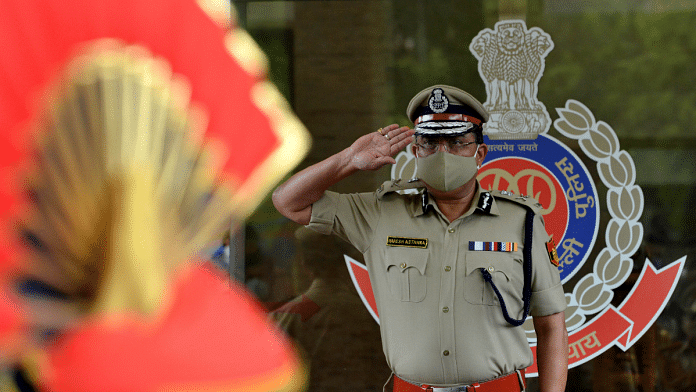New Delhi: An NGO Friday moved the Supreme Court challenging the appointment of Gujarat-cadre IPS officer Rakesh Asthana as Delhi Police Commissioner and the extension of his service by one year.
The 1984-batch IPS officer, serving as the director general of Border Security Force, was appointed Delhi Police Commissioner on July 27, four days before his superannuation on July 31. He will have a tenure of one year as police chief of the national capital.
The NGO, Centre for Public Interest Litigation’, urged the apex court to direct the central government to produce the July 27 order it issued, approving the inter-cadre deputation of Asthana from Gujarat cadre to AGMUT cadre.
The petition, moved by advocate Prashant Bhushan, also urged the court to set aside the Centre’s order to extend Asthana’s service period.
It termed the extension of his tenure as well as appointment as illegal as he did not have a residual tenure of mandatory six months of service at the time of his appointment as Commissioner of Police since he was to retire within 4 days.
Issue direction to the Union of India to initiate fresh steps for appointing Commissioner of Police, Delhi, strictly in accordance with the directions issued by this court earlier, it said.
The petition said that just four days before Asthana was due to retire on his superannuation, on July 31, 2021, the Ministry of Home Affairs granted him an inter-cadre transfer from his parent cadre of Gujarat to the AGMUT (cadre for Arunachal Pradesh, Goa Mizoram other Union Territories including Delhi) and granted him an extension of service for one year beyond the date of his superannuation, and further appointed him as the Commissioner of Police, Delhi.
It said both the orders passed by the central government and ACC on July 27 are completely illegal as it violated the directions issued by the SC in the Prakash Singh’ case of 2006.
It also claimed that the order violated the Fundamental Rule 56(d) which stipulates that that no government servant shall be granted extension in service beyond the age of retirement of sixty years.’
The central government did not have the power under Rule 3 of All India Services (Conditions of Service- Residuary Matters) Rules’, to relax Rule 16(1) of the All India Services (Death-Cum-Retirement Benefits) Rules, in order to give extension of service to Rakesh Asthana, the PIL claimed.
It further claimed that the Centre’s order violated the policy regarding Inter-Cadre deputation of All India Service Officers.
The impugned orders are in clear and blatant breach of the directions passed by this court in the Prakash Singh case as Asthana did not have a minimum residual tenure of six months, no UPSC panel was formed for appointment of Delhi Police Commissioner, and the criteria of having a minimum tenure of two years has been ignored, it said.
Also read: ‘Rakesh Asthana sent on special mission’ — Delhi assembly passes resolution against appointment
The petition also claimed that the High-Powered Committee comprising the Chief Justice of India, Prime Minister and the Leader of Opposition, in its meeting held on May 24, 2021 rejected the Central government’s attempt to appoint the same IPS officer (Asthana) as the CBI Director on the basis of the six-month rule’ as laid down in Prakash Singh case.
The appointment of Asthana to the post of Commissioner of Police, Delhi must be set aside on the same principle, it said.
Earlier on August 3, a bench headed by Chief Justice N V Ramana had said that the contempt plea of lawyer M L Sharma against Prime Minister Narendra Modi and Home Minister Amit Shah for appointing Asthana as the Delhi Police Chief in alleged violation of a judgement would be posted for hearing if the registry has numbered it.
According to the petition, the Prime Minister, who is the head of the Appointments Committee of the Cabinet, and the Home Minister jointly decided and appointed Asthana as the Commissioner.
On July 3, 2018, the top court had issued a slew of directions on police reforms in the country and ordered all states and Union Territories not to appoint any police officer as acting Director General of Police (DGP).
It had also directed all states to send the names of senior police officers to the Union Public Service Commission (UPSC) for being considered as probable candidates to be appointed as DGPs or Police Commissioners as the case may be.
The UPSC, in turn, will prepare a list of three most suitable officers and the states will be free to appoint one of them as police chief, it had said. The bench had also said that endeavour should be made that a person, who had been selected and appointed as DGP, has reasonable period of service left.
These directions were issued on interim pleas which were filed in the disposed of PIL, titled as Prakash Singh versus Union of India.
Prior to this, the apex court, deciding the PIL filed by two former DGPs Prakash Singh and N K Singh in 2006, had given a slew of directions, including setting up of a state security commission to ensure that the government does not exercise unwarranted influence on the police.
It had then said the appointment of DGPs and police officers should be merit-based and transparent and officers like DGPs and Superintendent of Police (SP) should have a minimum fixed tenure of two years.
It had recommended separation of police functions of investigation and maintaining law and order.
Also read: Plea against appointment of Delhi Police chief Asthana to be heard after being numbered: SC



